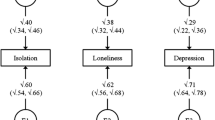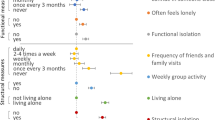Abstract
Background
There is considerable evidence that depression and low social support are associated with increased morbidity and mortality for patients with coronary heart disease (CHD). However, there is a lack of consensus regarding the measurement of social support and its relation to depression.
Purpose
The primary purpose of the present study was to identify key dimensions of existing social support and depression measures for patients with CHD using factor analysis.
Method
Seven hundred-five patients with a recent acute myocardial infarction and either depression, low social support, or both, completed measures of several types of social support and depression. Exploratory and confirmatory factor analysis were used to examine the underlying dimensions of the existing social support and depression measures, and to compare theoretically plausible models specifying the relation between the social support and depression factors.
Results
Confirmatory factor analysis indicated that an approach in which smaller facets of depression are measured (somatic, cognitive/affective, anxious) and social support (perceived emotional support from intimate relationships; perceived tangible support from peripheral contacts; and the number of children, relatives, and friends in a patient’s support network), may be the most optimal way to measure social support and depression in this population RMSEA = 0.05; CFI = 0.81; TLI = 0.88).
Conclusion
Efforts to identify patients at increased psychosocial risk may be improved by screening for these subcomponents of social support and depression.
Similar content being viewed by others
Notes
Detailed results of this analysis are available at http://www.duke.edu/web/behavioralmed/invariance.pdf
References
Berkman LF. The role of social relations in health promotion. Psychosom Med. 1995;57:245–54.
Hemingway H, Marmot M. Evidence based cardiology: psychosocial factors in the aetiology and prognosis of coronary heart disease. Systematic review of prospective cohort studies. BMJ. 1999;318:1460–7.
Kuper H, Marmot M, Hemingway H. Systematic review of prospective cohort studies of psychosocial factors in the etiology and prognosis of coronary heart disease. Semin Vasc Med. 2002;2:267–314.
Smith TW, Ruiz JM. Psychosocial influences on the development and course of coronary heart disease: current status and implications for research and practice. J Consult Clin Psychol. 2002;70:548–68.
Rozanski A, Blumenthal JA, Kaplan J. Impact of psychological factors on the pathogenesis of cardiovascular disease and implications for therapy. Circulation. 1999;99:2192–217.
Lett H, Blumenthal J, Babyak M, Sherwood A, Strauman T, Robins C. Depression as a risk factor for coronary artery disease: evidence, mechanisms, and treatment. Psychosom Med. 2004;66:305–15.
van Melle J, de Jonge P, Spijkerman T, Tijssen J, Ormel J, van Veldhuisen D, et al. Prognostic Association of Depression following myocardial infarction with mortality and cardiovascular events: a meta-analysis. Psychosom Med. 2004;66:814–22.
Barth J, Schumacher M, Herrmann-Linger C. Depression as a risk factor for mortality in patients with coronary heart disease: a meta-analysis. Psychosom Med. 2004;66:802–13.
Carney RM, Blumenthal JA, Catellier D, Freedland KE, Berkman LF, Watkins LL, et al. Depression as a risk factor for mortality after acute myocardial infarction. Am J Cardiol. 2003;92:1277–81.
Lett H, Blumenthal J, Babyak M, Strauman T, Robbins C, Sherwood A. Social support and coronary heart disease: epidemiologic evidence and implications for treatment. Psychosom Med. 2005;67:869–78.
Barefoot JC, Brummett BH, Clapp-Channing NE, Siegler IC, Vitaliano PP, Williams RB, et al. Moderators of the effect of social support on depressive symptoms in cardiac patients. Am J Cardiol. 2000;86:438–42.
Barefoot JC, Brummett BH, Helms MJ, Mark DB, Siegler IC, Williams RB. Depressive symptoms and survival of patients with coronary artery disease. Psychosom Med. 2000;62:790–5.
de Jonge P, Ormel J, van den Brink RH, van Melle J, Spijkerman T, Kuiper A, et al. Symptom dimensions of depression following myocardial infarction and their relationship with somatic health status and cardiovascular prognosis. Am J Psychiatr. 2006;163:138–44.
Sarason BR, Sarason IG. Assessment of social support. In: Shumaker S, Czajkowski SM, editors. Social support and cardiovascular disease. New York: Plenum; 1994. p. 41–64.
Uchino BN. Social support and physical health. New Haven: Yale University; 2004.
O'Reilly P. Methodological issues in social support and social network research. Soc Sci Med. 1988;26:863–73.
Langford CP, Bowsher J, Maloney JP, Lillis PP. Social support: a conceptual analysis. J Adv Nurs. 1997;25:95–100.
Henderson AS. Interpreting the evidence on social support. Soc Psychiatry. 1984;19:49–52.
Sarason IG, Sarason BR, Shearin EN. Social support as an individual difference variable: its stability, origins, and relational aspects. J Pers Soc Psychol. 1986;50:845–55.
Antonucci TC, Johnson E. Conceptualization and methods in social support theory and research as related to cardiovascular disease. In: Shumaker S, Czajkowski SM, editors. Social support and cardiovascular disease. New York: Plenum; 1994. p. 21–40.
Brummett BH, Babyak MA, Barefoot JC, Bosworth HB, Clapp-Channing NE, Siegler IC, et al. Social support and hostility as predictors of depressive symptoms in cardiac patients one month after hospitalization: a prospective study. Psychosom Med. 1998;60:707–13.
Holahan CJ, Moos RH, Holahan CK, Brennan PL. Social context, coping strategies, and depressive symptoms: an expanded model with cardiac patients. J Pers Soc Psychol. 1997;72:918–28.
Frasure-Smith N, Lesperance F, Gravel G, Masson A, Juneau M, Talajic M, et al. Social support, depression, and mortality during the first year after myocardial infarction. Circulation. 2000;101:1919–24.
Burker EJ, Blumenthal JA, Feldman M, Burnett R, White W, Smith LR, et al. Depression in male and female patients undergoing cardiac surgery. Br J Clin Psychol. 1995;34:119–28.
Krishnan KR, George LK, Pieper CF, Jiang W, Arias R, Look A, et al. Depression and social support in elderly patients with cardiac disease. Am Heart J. 1998;136:491–5.
Raynor DA, Pogue-Geile MF, Kamarck TW, McCaffery JM, Manuck SB. Covariation of psychosocial characteristics associated with cardiovascular disease: genetic and environmental influences. Psychosom Med. 2002;64:191–203.
Holahan CJ, Moos RH, Holahan CK, Brennan PL. Social support, coping, and depressive symptoms in a late-middle-aged sample of patients reporting cardiac illness. Health Psychol. 1995;14:152–63.
Bosworth HB, Steffens DC, Kuchibhatla MN, Jiang WJ, Arias RM, O'Connor CM, et al. The relationship of social support, social networks and negative events with depression in patients with coronary artery disease. Aging Ment Health. 2001;4:253–8.
Penninx BWJH, van Tilburg T, Boeke AJ, Deeg DJH, Kriegsman DMW, van Eijk JT. Effects of social support and personal coping resources on depressive symptoms: different for various chronic diseases? Health Psychol. 1998;17:551–8.
Oxman TE, Hull JG. Social support, depression, and activities of daily living in older heart surgery patients. J Geront Ser B Psychol Sci Soc Sci. 1997;52B:P1–14.
Wade TD, Kendler KS. The relationship between social support and major depression: cross-sectional, longitudinal, and genetic perspectives. J of Nerv Ment Dis. 2000;188:251–8.
Lara ME, Leader J, Klein DN. The association between social support and course of depression: is it confounded with personality? J Abnorm Psychol. 1997;106:478–82.
Berkman LF, Blumenthal J, Burg M, Carney RM, Catellier D, Cowan MJ, et al. Effects of treating depression and low perceived social support on clinical events after myocardial infarction: the Enhancing Recovery in Coronary Heart Disease Patients (ENRICHD) Randomized Trial. JAMA. 2003;289:3106–16.
ENRICHD I. Enhancing recovery in coronary heart disease (ENRICHD): baseline characteristics. Am J Cardiol. 2001;88:316–22.
Freedland KE, Skala JA, Carney RM, Raczynski JM, Taylor CB, Mendes de Leon CF, et al. The Depression Interview and Structured Hamilton (DISH): Rationale, development, characteristics and clinical validity. Psychosom Med. 2002;64:897–905.
Cohen S, Mermelstein R, Kamarck TW, Hoberman HM. Measuring the functional components of social support. In: Sarason IG, Sarason BR, editors. Social support: theory, research, and applications. Boston: Martinus Nijhoff; 1985. p. 73–113.
Blumenthal JA, Burg MM, Barefoot J, Williams RB, Haney T, Zimet G. Social support, type A behavior, and coronary artery disease. Psychosom Med. 1987;49:331–40.
Zimet GD, Dahlem NW, Zimet SG, Farley GK. The multidimensional scale of perceived social support. J Pers Assess. 1988;52:30–41.
Glass TA, Mendes de Leon CF, Seeman T, Berkman L. Beyond single indicators of social networks: a Lisrel analysis of social ties among the elderly. Soc Sci Med. 1997;44:1503–17.
Mitchell PH, Powell L, Blumenthal J, Norten J, Ironson G, Pitula CR, et al. A short social support measure for patients recovering from myocardial infarction: the ENRICHD Social Support Inventory. J Cardiopul Rehab. 2003;23:398–403.
Robins LN, Helzer JE, Crougham J, Ratliff K. National Institute of Mental Health diagnostic interview schedule. Arch Gen Psychiatry. 1981;38:381–9.
Hamilton M. A rating scale for depression. J Neurol. 1960;23:56–61.
Dozois DJ. The psychometric characteristics of the Hamilton Depression Inventory. J Pers Assess. 2003;80:31–40.
Knesevich JW, Biggs JT, Clayton PJ, Ziegler VE. Validity of the Hamilton rating scale for depression. Br J Psychiatry. 1977;131:49–52.
Beck AT, Ward CH, Mendelsohn M. An inventory for measuring depression. Arch Gen Psychiatry. 1961;4:561–71.
Beck AT, Steer RA, Garbin MG. Psychometric properties of the Beck Depression Inventory: twenty-five years of evaluation. Clin Psychol Rev. 1988;8:77–100.
Muthen LK, Muthen BO. Mplus: statistical analysis with latent variables. 3rd ed. Los Angeles: Muthen & Muthen; 2004.
Hu L, Bentler PM. Evaluation modeling fit. In: Hoyle R, editor. Structural equation modeling. Thousand Oaks, CA: Sage; 1995. p. 76–99.
Hu L, Bentler PM. Cutoff criteria in fix indexes in covariance structure analysis: conventional criteria versus new alternatives. Struct Equ Modeling. 1999;6:1–55.
Muthen BO. Latent variable modeling in heterogeneous populations. Psychometrika. 1989;54:557–85.
Green SB, Babyak MA. Control of type I error in structural equation models. Multivariate Behav Res. 1997;32:39–51.
Reuterberg S-E, Gustafsson J-E. Confirmatory factor analysis and reliability: testing measurement model assumptions. Educ Psychol Measur. 1992;52:795–811.
Kubzansky LD, Kawachi I. Going to the heart of the matter: do negative emotions cause coronary heart disease? J Psychosom Res. 2000;48:323–37.
Denollet J, Brutsaert DL. Personality, disease severity, and the risk of long-term cardiac events in patients with a decreased ejection fraction after myocardial infarction. Circulation. 1998;97:167–73.
Denollet J, Vaes J, Brutsaert DL. Inadequate response to treatment in coronary heart disease: adverse effects of type D personality and younger age on 5-year prognosis and quality of life. Circulation. 2000;102:630–5.
Williams RB, Marchuk DA, Gadde KM, Barefoot JC, Grichnik K, Helms MJ, et al. Central nervous system serotonin function and cardiovascular responses to stress. Psychosom Med. 2001;63:300–5.
Lett HS, Blumenthal JA, Babyak MA, Catellier DJ, Carney RM, Berkman LF, et al. Social support and prognosis in patients at increased psychosocial risk recovering from myocardial infarction. Health Psychol. 2007;26(4):418–27.
Beck AT, Steer RA, Brown GK. Beck Depression Inventory manual. 2nd ed. San Antonio, Tx: The Psychological Corporation; 1996.
Acknowledgments
Supported by contracts NO1-HC-55140, NO1-HC-55141, NO1-HC-55142, NO1-HC-55143, NO1-HC-55144, NO1-HC-55145, NO1-HC-55146, NO1-HC-55147, NO1-HC-55148 and by a grant HL 080664 from the National Heart, Lung, and Blood Institute, National Institutes of Health, Bethesda, Maryland. This work was based upon the doctoral dissertation of the first author (HSL) under the direction of the second author (JAB); all data analyses were overseen by the third author (MAB). The authors wish to thank all of the co-investigators of the ENRICHD trial for making this study possible.
Author information
Authors and Affiliations
Corresponding author
Rights and permissions
About this article
Cite this article
Lett, H.S., Blumenthal, J.A., Babyak, M.A. et al. Dimensions of Social Support and Depression in Patients at Increased Psychosocial Risk Recovering from Myocardial Infarction. Int.J. Behav. Med. 16, 248–258 (2009). https://doi.org/10.1007/s12529-009-9040-x
Published:
Issue Date:
DOI: https://doi.org/10.1007/s12529-009-9040-x




